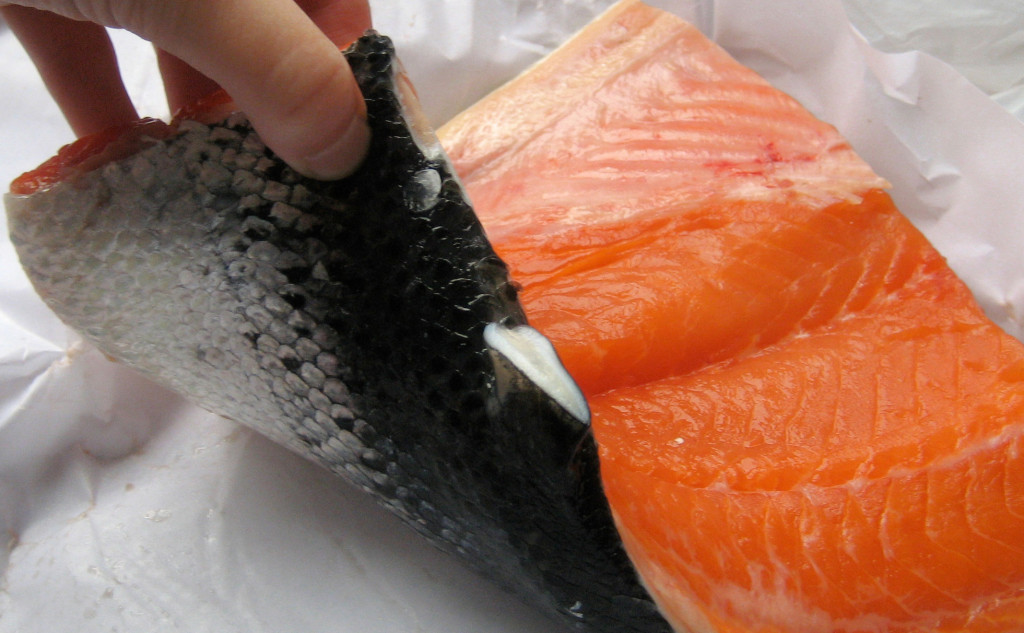
In this week’s #SkepticalTuesday post, I take a look at the facts of farmed vs. wild-caught salmon and ask: “what’s the difference?”
***
Last week a Quartz.com article found its way, as things do, into my Facebook feed. Called “Here’s Why Your Farmed Salmon Has Color Added To It”, the article answers a question you probably never thought to ask, because, like most people, you probably didn’t know your farmed salmon has color added to it. Turns out, farmed salmon isn’t naturally pink like its wild equivalent, because their diet is different. So companies like Hoffman-Laroche and DSM have produced an additive to give the farmed whitish-grey salmon it’s familiar pinkish hue. It’s an interesting bit on the way our expectations shape market forces — if salmon isn’t pink like we expect, it’s very hard to sell.
Oh how I wish it had been written objectively, though. Much of the article gives off the reek of frankenfood scaremongering, from the choice to mention that the yeast in farmed salmon feed is “genetically engineered,” to the scare-quotes around the word “naturally” when describing the process of adding ground up krill to the feed to give the salmon its pink hue (without using those dreaded “petrochemicals”). But what really stuck in my craw was this statement:
Aside from the logical flaw that insists that the reason we prefer pink salmon to white is “the fact of its being wild” rather than “the fact of its being what we’re used to,” there are a few claims in there that made me wonder: is that actually true?
Sure, I’ll believe wild-caught salmon is more expensive, that’s a no-brainer. But is wild salmon really tastier? And more importantly, is it really more nutritious?
As for taste, well, it’s pretty subjective. A lot of websites will tell you farmed salmon tastes better, but in at least one blind taste-test farmed salmon has come out on top. Wild salmon has less fat, smaller flakes, and a denser texture, but whether you prefer the taste of that over slightly fattier fish is a little like debating whether you prefer Cabernet Sauvignon or Merlot. They’re different, but people like both.
But the nutrition angle can be actually quantified, and, unsurprisingly enough, has been. And, in a way sure to prevent the story from ever hitting the traditional news media, the results are mixed.
Salmon — all salmon — is both good for you and bad for you. It’s got a lot of great stuff in it: fatty acids (those omega-3s people are always talking about, as well as EHA and DHA), protein, minerals. But salmon meat also suffers from a fairly high level of environmental contamination: PCBs, dioxin and dioxin-like chemicals. The long and short of it is that while farmed salmon have higher levels of those healthful fatty acids, they also contain higher levels of environmental contaminants.
What makes the situation more murky, too, is that not all farmed salmon is created equal. Treating all farmed salmon as the same is a mistake.
This study in the journal Aquaculture in 2006 found similar levels of vitamin D in both farmed and wild, and higher levels of fatty acids in the farmed salmon. Although it has a small sample size, it’s interesting because both farmed and wild samples were Atlantic salmon. This is important because you rarely eat wild Atlantic salmon — the fisheries have been sorely depleted — so almost all comparisons are between wild Pacific salmon and farmed Atlantic salmon, making it very hard to tell what differences are due to the farming and what are due to the species.
This study from the Journal of Nutrition in 2005 attempts to calculate both cancer and noncancer risk-to-benefit ratios for Pacific wild caught salmon and Atlantic farmed salmon. It finds that the risk-to-benefit ratio is better in the wild Pacific, but not by a huge margin — especially when considering different farming areas:
Farmed salmon from Europe scored lower.
So what’s the answer: is wild salmon really “more nutritious”? It depends on what you mean. If fatty acids are your thing, it’s farmed salmon, hands-down. But if you want to limit your exposure to contaminants, then some farmed salmon is probably as good, but probably not all. And Pacific might (and I stress might) be better than Atlantic. Maybe.
And that’s why nobody will report on it: because the truth is rarely simple, rarely sensational, and rarely clear.
***
Richard Ford Burley is a doctoral candidate in English at Boston College, where he’s writing about remix culture and the processes that generate texts in the Middle Ages and on the internet. He was recently saved from a promising career as a hikikomori by a brilliant renaissance woman who swept him off his feet, and now he lives with her and their completely mental cat in Brighton.
